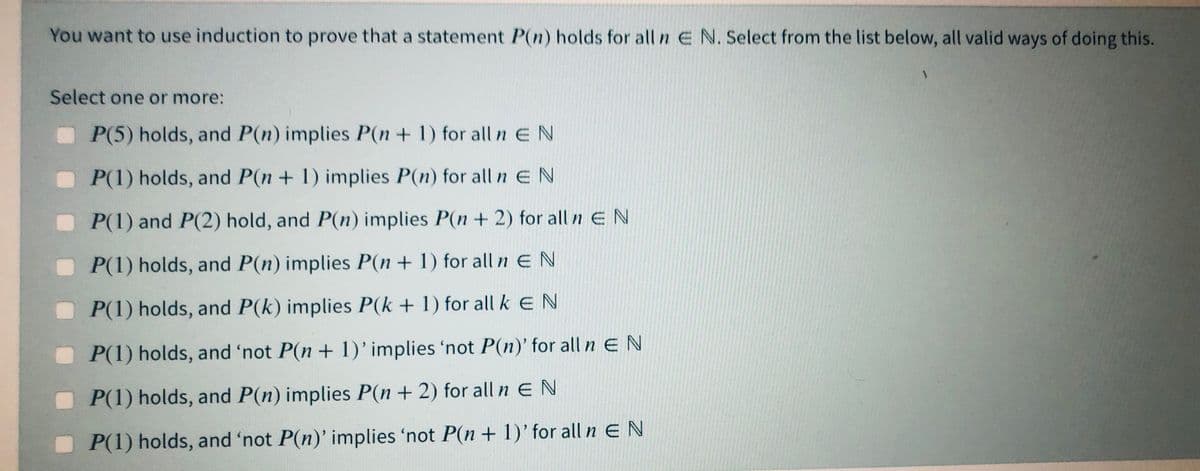You want to use induction to prove that a statement P(n) holds for all n E N. Select from the list below, all valid ways of doing this. Select one or more: O P(5) holds, and P(n) implies P(n+ 1) for all n EN P(1) holds, and P(n + 1) implies P(n) for all n EN P(1) and P(2) hold, and P(n) implies P(n+ 2) for all n E N P(1) holds, and P(n) implies P(n + 1) for all n EN P(1) holds, and P(k) implies P(k + 1) for all k EN P(1) holds, and 'not P(n + 1)'implies 'not P(n)' for all n E N P(1) holds, and P(n) implies P(n + 2) for all n E N P(1) holds, and 'not P(n)' implies 'not P(n + 1)' for all n EN
You want to use induction to prove that a statement P(n) holds for all n E N. Select from the list below, all valid ways of doing this. Select one or more: O P(5) holds, and P(n) implies P(n+ 1) for all n EN P(1) holds, and P(n + 1) implies P(n) for all n EN P(1) and P(2) hold, and P(n) implies P(n+ 2) for all n E N P(1) holds, and P(n) implies P(n + 1) for all n EN P(1) holds, and P(k) implies P(k + 1) for all k EN P(1) holds, and 'not P(n + 1)'implies 'not P(n)' for all n E N P(1) holds, and P(n) implies P(n + 2) for all n E N P(1) holds, and 'not P(n)' implies 'not P(n + 1)' for all n EN
College Algebra (MindTap Course List)
12th Edition
ISBN:9781305652231
Author:R. David Gustafson, Jeff Hughes
Publisher:R. David Gustafson, Jeff Hughes
Chapter8: Sequences, Series, And Probability
Section8.5: Mathematical Induction
Problem 42E
Related questions
Topic Video
Question

Transcribed Image Text:You want to use induction to prove that a statement P(n) holds for all n E N. Select from the list below, all valid ways of doing this.
Select one or more:
P(5) holds, and P(n) implies P(n + 1) for all n EN
P(1) holds, and P(n + 1) implies P(n) for alln EN
P(1) and P(2) hold, and P(n) implies P(n + 2) for all n E N
P(1) holds, and P(n) implies P(n+ 1) for all n EN
P(1) holds, and P(k) implies P(k + 1) for all kEN
P(1) holds, and 'not P(n + 1)'implies 'not P(n)' for all n E N
P(1) holds, and P(n) implies P(n+ 2) for all n EN
P(1) holds, and 'not P(n)' implies 'not P(n + 1)' for all n E N
Expert Solution
This question has been solved!
Explore an expertly crafted, step-by-step solution for a thorough understanding of key concepts.
Step by step
Solved in 4 steps

Knowledge Booster
Learn more about
Need a deep-dive on the concept behind this application? Look no further. Learn more about this topic, calculus and related others by exploring similar questions and additional content below.Recommended textbooks for you

College Algebra (MindTap Course List)
Algebra
ISBN:
9781305652231
Author:
R. David Gustafson, Jeff Hughes
Publisher:
Cengage Learning

Elements Of Modern Algebra
Algebra
ISBN:
9781285463230
Author:
Gilbert, Linda, Jimmie
Publisher:
Cengage Learning,

College Algebra
Algebra
ISBN:
9781305115545
Author:
James Stewart, Lothar Redlin, Saleem Watson
Publisher:
Cengage Learning

College Algebra (MindTap Course List)
Algebra
ISBN:
9781305652231
Author:
R. David Gustafson, Jeff Hughes
Publisher:
Cengage Learning

Elements Of Modern Algebra
Algebra
ISBN:
9781285463230
Author:
Gilbert, Linda, Jimmie
Publisher:
Cengage Learning,

College Algebra
Algebra
ISBN:
9781305115545
Author:
James Stewart, Lothar Redlin, Saleem Watson
Publisher:
Cengage Learning


Linear Algebra: A Modern Introduction
Algebra
ISBN:
9781285463247
Author:
David Poole
Publisher:
Cengage Learning

Algebra and Trigonometry (MindTap Course List)
Algebra
ISBN:
9781305071742
Author:
James Stewart, Lothar Redlin, Saleem Watson
Publisher:
Cengage Learning